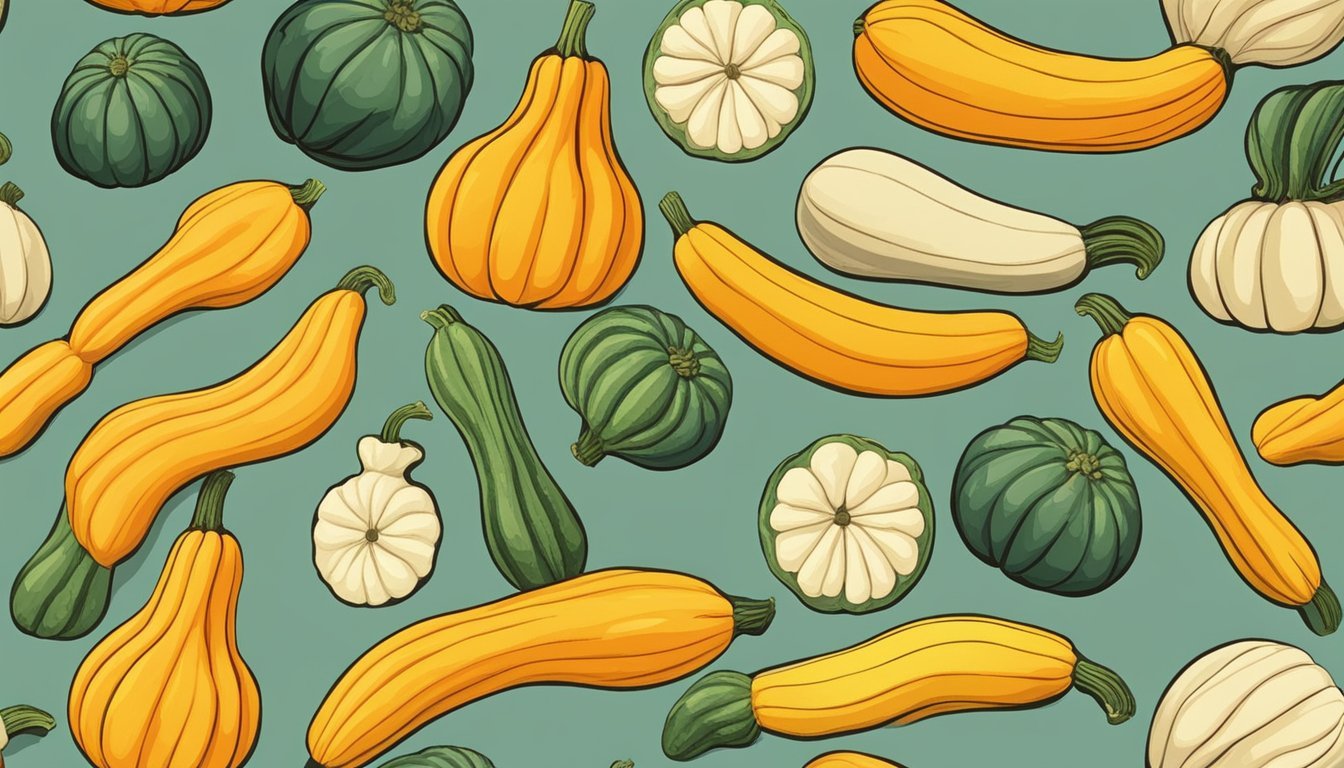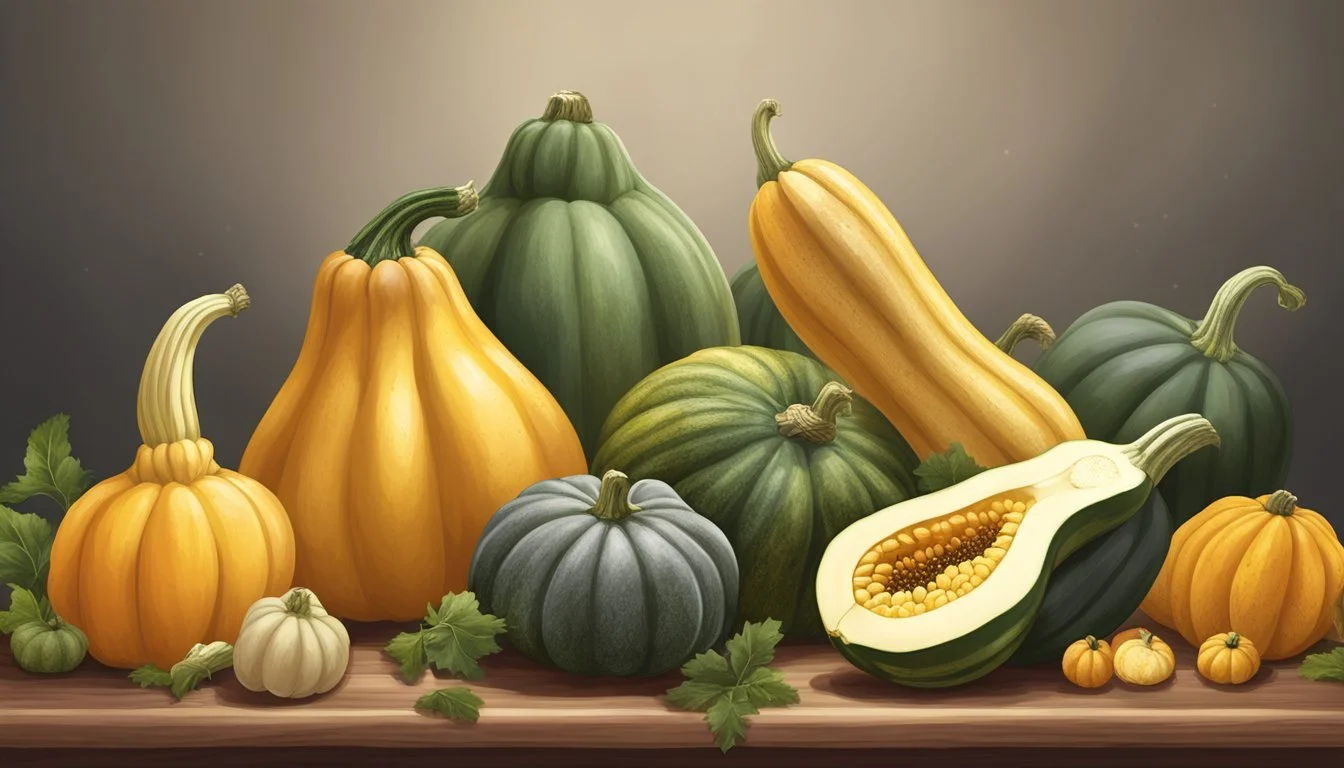Delicata Squash Substitutes
Best Alternatives for Recipes
Delicata squash, known for its sweet, nutty flavor and tender skin, is a beloved ingredient in many kitchens. Sometimes, though, it can be hard to find. When delicata squash isn't available, suitable substitutes include butternut squash, acorn squash, and kabocha squash. These alternatives offer similar textures and culinary versatility.
Butternut squash, with its creamy flesh and sweet taste, is often the go-to substitute. Kabocha squash, less common yet equally delectable, provides a rich, sweet flavor. Additionally, sugar pumpkins and patty pan squash can work well in various recipes, giving cooks plenty of options when delicata squash is out of season.
Carnival squash, with its colorful appearance and buttery flavor, adds a festive touch to dishes. Even sweet potatoes can stand in for delicata squash, bringing a different but equally enjoyable sweetness and texture to your meals.
Understanding Delicata Squash
Delicata squash is a type of winter squash, known for its oblong shape and distinctive cream-colored skin with green stripes.
One of the unique features of delicata squash is its edible skin, which eliminates the need for peeling. This makes it a convenient option for quick meal preparations.
In terms of nutrition, delicata squash is a powerhouse. It is rich in Vitamin A, which is essential for maintaining healthy vision and immune function. Additionally, it contains Vitamin C, which supports skin health and immune defense.
Delicata squash is also a good source of potassium, a mineral crucial for heart health and muscle function.
Moreover, it is high in dietary fiber, which aids in digestion and helps maintain a healthy weight.
The flesh of delicata squash is sweet and mildly nutty, making it a versatile ingredient in various culinary applications. It can be roasted, stuffed, or added to soups and stews.
In addition to its tasty flesh, the seeds of delicata squash can be roasted for a nutritious snack.
Whether for its nutritious profile or its ease of preparation, delicata squash is a valuable addition to any diet.
Culinary Uses of Delicata Squash
Delicata squash can be used in various culinary applications, including roasting, baking, soups, and salads. Its tender flesh and sweet flavor make it suitable for numerous recipes, from hearty main dishes to light, refreshing salads.
Roasting and Baking
Roasting delicata squash enhances its natural sweetness and produces a soft, caramelized texture. To prepare, cut the squash into rings or half-moons, remove the seeds, and drizzle with olive oil. Sprinkle with salt and pepper before roasting at 400°F for about 25-30 minutes. Baking is another option. Halve the squash lengthwise, scoop out the seeds, and bake with a filling like quinoa or cheese.
Soups and Salads
Delicata squash adds a rich, creamy texture to soups. Cut it into cubes and simmer with broth and other vegetables, then blend for a smooth consistency. This squash pairs well with spices like nutmeg or curry powder. In salads, roasted delicata squash rings or cubes provide a sweet and nutty flavor. Combine with arugula, feta cheese, and a light vinaigrette for a refreshing dish.
Stuffing and Pasta
Stuffing delicata squash involves halving it lengthwise, removing the seeds, and filling the cavity with ingredients such as grains, dried fruits, nuts, or ground meat. This method is both visually appealing and flavorful. In pasta dishes, delicata squash can be incorporated as roasted pieces or blended into a sauce. It complements pasta types like penne or fusilli and pairs well with sage, brown butter, or Parmesan cheese.
Characteristics of Good Substitutes
When selecting a substitute for delicata squash, it is essential to consider the flavor profile, texture, and nutritional composition to ensure the closest match.
Flavor Profile
Good substitutes should have a sweet and nutty flavor similar to delicata squash. Butternut squash and acorn squash both possess these characteristics.
Kabocha squash also offers a sweet taste but with a slightly more earthy undertone. Sweet potatoes can be a good option; they have a naturally sweet flavor, though they lack the nuttiness found in squashes. Carnival squash combines the flavors of both acorn and butternut, providing a versatile alternative. Patty pan squash has a milder taste and may be less sweet but can still work in various recipes.
Texture Considerations
Texture is crucial when choosing a substitute for delicata squash. Butternut squash offers a creamy texture that works well in purees and soups. It cooks in a similar manner to delicata, making it ideal in most recipes.
Acorn squash has firmer, more fibrous flesh which holds up well in roasting and stuffing. Kabocha squash provides a dense, starchy texture similar to pumpkin, making it a suitable choice for more hearty dishes. Patty pan squash has a tender texture, making it perfect for grilling or sautéing. Sweet potatoes are smooth and creamy, though they can be denser than delicata squash.
Nutritional Composition
Nutritional similarities help maintain the health benefits of the original ingredient. Butternut squash is rich in vitamins A and C, similar to delicata, and also offers fiber and potassium. Acorn squash is an excellent source of dietary fiber and contains significant amounts of vitamins A and C and potassium.
Kabocha squash brings a slightly different nutritional profile with high levels of beta-carotene and vitamin C. Sweet potatoes are packed with nutrients, including high amounts of vitamins A and C, potassium, and dietary fiber. Patty pan squash is less dense in nutrients but still provides a decent amount of vitamins and minerals, most notably vitamin C and folate.
Best Substitutes for Delicata Squash
Delicata squash has a sweet, nutty flavor and tender flesh, which makes it a favorite in many dishes. When it's not available, there are several excellent substitutes that can provide similar flavors and textures.
Sweet Potato and Sweet Potato Squash
Sweet potatoes and sweet potato squash are excellent substitutes for delicata squash due to their sweet taste and creamy texture. Both can be roasted, mashed, or used in soups and stews. Sweet potatoes are rich in vitamins A and C, fiber, and potassium, making them a nutritious alternative. They caramelize beautifully when roasted, offering a depth of flavor similar to delicata squash.
Butternut and Honeynut Squash
Butternut squash, with its creamy texture and sweet, nutty flavor, is a popular substitute for delicata squash. It is versatile in cooking methods, including baking, roasting, and pureeing. Honeynut squash, a smaller and sweeter variety of butternut, provides a concentrated flavor. Both varieties are high in fiber, vitamin A, and potassium, offering nutritional benefits comparable to delicata squash.
Acorn and Carnival Squash
Acorn squash, with its mild sweetness and slightly fibrous texture, makes a good replacement for delicata squash. Carnival squash, a variety of acorn squash, has a festive appearance and a flavor profile that blends sweet and nutty notes. These squashes can be roasted, baked, or stuffed, making them versatile options in many recipes. They are also rich in vitamins A and C, adding a nutritional boost.
Pumpkin and Sugar Pumpkin
Pumpkin, particularly sugar pumpkin, offers a sweet and slightly earthy flavor that suits many dishes where delicata squash would be used. Sugar pumpkins have a denser texture and can be roasted, pureed, or used in soups and baking. They are high in fiber, vitamins A and C, and potassium. The mild sweetness and firm flesh make them an excellent substitute for delicata squash.
Spaghetti and Kabocha Squash
Spaghetti squash, with its stringy texture when cooked, provides a unique substitute for delicata squash in certain dishes. While its flavor is milder, its texture can add an interesting twist to recipes like casseroles and pasta substitutes. Kabocha squash, on the other hand, has a sweeter and denser flesh, similar to delicata squash. It is ideal for roasting and soups, and it is rich in beta-carotene and fiber.
These substitutes can bring similar flavors and textures to dishes typically made with delicata squash, ensuring minimal compromise in culinary creations.
Lesser-Known Substitutes
There are several lesser-known substitutes for Delicata squash that offer unique flavors and textures. These alternatives can be just as delicious and nutritious, providing various culinary options.
Hubbard and Buttercup Squash
Hubbard squash is a large, bumpy-skinned winter squash with a dense, sweet flesh. It is excellent for roasting and making soups due to its rich texture and flavor. The flesh is yellow-orange and can be pureed or cubed for various dishes.
Buttercup squash has a sweet, nutty flavor similar to Delicata squash. Its flesh is deep orange, very smooth, and flavorful, making it ideal for baking, steaming, or mashing. Buttercup's dense texture holds up well in stews and hearty dishes.
Sweet Dumpling and Peanut Squash
Sweet Dumpling squash is small, round, and has a creamy, sweet flavor. It’s perfect for stuffing or roasting. The skin is thin and edible, making it easy to prepare. Its flavor profile is delicate, complementing both savory and sweet dishes.
Peanut squash, also known as Galeux d’Eysines, features a unique warty skin. It has a sweet, rich flavor, and its texture is smooth and satisfying. The flesh is excellent for soups or purees. Its distinctive appearance makes it a fun addition to autumnal dishes.
Bohemian Squash and Japanese Pumpkin
Bohemian squash, also referred to as carnival squash, is colorful and slightly nutty. The flesh is firm yet tender when cooked, and it works well in both savory and sweet recipes. This versatile squash can be roasted, baked, or stuffed.
Japanese Pumpkin, or Kabocha squash, has a sweet, chestnut-like flavor. Its texture is rich and creamy, making it perfect for soups, tempura, or simply roasted. The deep orange flesh is packed with nutrients and has an appealing sweetness that stands out.
Butter and Pie Pumpkin
Butter squash, sometimes confused with butternut but distinct in its rounder shape, has a subtle, sweet flavor. Its flesh is moderately sweet and smooth, ideal for soups, pie fillings, and purees. It’s a nutritious choice, containing high levels of beta carotene and vitamins A and C.
Pie Pumpkin, also known as sugar pumpkin, is smaller and sweeter than typical pumpkins. Its flesh is excellent for baking, especially in pies and desserts, though it can also be roasted or steamed. The smooth, creamy texture and sweet flavor make it a versatile ingredient.
These lesser-known substitutes provide a range of flavors and textures, making them excellent alternatives to delicata squash in various culinary applications.
Considerations for Cooking with Substitutes
When using substitutes for delicata squash, it is essential to understand how different squashes may impact cooking methods, seasoning choices, and the final presentation. Addressing these aspects will ensure a successful and tasty result.
Adjusting Cooking Times
Different squashes may require varying cooking times. Butternut squash and sweet potatoes often take longer to cook because of their denser texture compared to the more tender delicata squash. Making sure to adjust the oven or stovetop heat accordingly can help avoid undercooked or overly mushy textures.
For a smooth outcome, always monitor the cooking process closely and test for doneness by piercing the flesh with a fork. The precise cooking time may vary based on size, preparation method, and desired texture.
Seasoning and Flavor Enhancements
Choosing appropriate seasonings is vital when substituting delicata squash. Its natural sweetness pairs well with spices like cinnamon, nutmeg, and savory herbs such as thyme and rosemary.
When using a substitute such as acorn squash or sugar pumpkins, which also have a sweet and nutty flavor, the seasoning can be kept the same. For less sweet alternatives, adding a sweet element like a drizzle of honey or maple syrup can mimic delicata's flavor profile.
Presentation and Texture
The texture and presentation of substitutes play a critical role in a dish’s appeal. Delicata’s creamy texture and edible rind make it unique. When using butternut or spaghetti squash, additional care in presentation is necessary, as they require peeling.
To replicate the attractive appearance of delicata, cut the substitutes into uniform pieces and ensure even cooking. Helping retain a visually appealing texture, roasting or sautéing methods often work best. For substitutes like Kabocha squash, which have tender skins, leaving the skin on can replicate delicata’s presentation and add to the dish's aesthetic appeal.
Nutritional and Health Benefits
Delicata squash offers a range of nutritional and health benefits, making it a valuable addition to any diet. Rich in essential vitamins and minerals, it also provides significant dietary fiber, contributing to digestive health.
Vitamins and Minerals
Delicata squash is a rich source of essential nutrients. It contains notable amounts of Vitamin A and Vitamin C, both crucial for maintaining a healthy immune system. Vitamin A, found in the form of beta-carotene, supports vision and skin health, while Vitamin C functions as a powerful antioxidant and aids in collagen production.
Other vital minerals present include Potassium, Magnesium, and Manganese. Potassium helps regulate blood pressure and fluid balance. Magnesium supports muscle and nerve function. Manganese plays a role in bone formation and metabolic processes. Additionally, delicata squash contains Iron, which is fundamental for oxygen transport in the blood.
Dietary Fiber and Digestive Health
The dietary fiber content in delicata squash is noteworthy. Both soluble and insoluble fibers are present in its peel and flesh. Soluble fiber helps to reduce cholesterol levels and control blood sugar spikes, while insoluble fiber promotes regular bowel movements and prevents constipation.
With approximately 1.5 grams of fiber per 100 grams, delicata squash supports digestive health effectively. This fiber content not only aids digestion but also contributes to a feeling of fullness, which can be beneficial for weight management. A diet rich in fiber from vegetables like delicata squash can ease digestive issues and improve overall gut health.
Storing Substitutes
Delicata squash substitutes can be stored short-term or long-term, including freezing.
Short-Term Storage
For substitutes like butternut, acorn, and kabocha squash, keep them in a cool, dry place such as a pantry. Store them unwashed to prevent moisture build-up. Sweet potatoes and sugar pumpkins should also be stored this way. Ideal temperatures range between 50-60°F (10-15°C).
Red, yellow, and russet potatoes can be kept in a similar environment, away from light to prevent sprouting. Check them regularly for soft spots or mold. Spaghetti squash is best stored at room temperature but away from direct sunlight.
Long-Term Storage and Freezing
For longer storage, many substitutes can be frozen. First, peel and cube the vegetables such as butternut, acorn, and kabocha squash. Blanching before freezing helps retain texture and flavor. Place blanched pieces in airtight containers or freezer bags.
Sweet potatoes should be cooked prior to freezing. Mash them and store in small portions to thaw easily. Sugar pumpkins can be pureed and stored similarly.
Note: Avoid freezing whole or raw potatoes as they can become watery.
Proper labeling with stored dates ensures tracking and usage within three months for optimal quality.





